Valley
Shops, businesses and people in Valley are flouting safety protocols as Covid-19 cases continue to rise
Government has failed to monitor and enforce the rules due to practical hindrances, Corona Crisis Management Centre secretary says.
Anup Ojha
In mid-June, the government relaxed a nationwide lockdown after nearly three months after traders and other entrepreneurs started to protest the absolute lockdown which had halted all economic activities.
As the government eased the lockdown rules, the government also issued a series of health and safety protocols to prevent the spread of the coronavirus. The lockdown restrictions were lifted for private vehicles on the condition that they operate on odd-even number basis corresponding with the Nepali date.
However, the rule for vehicles could not be enforced strictly. From the second day of the lockdown relaxation, motorists started descending on the streets in droves, defying the odd-even rationing rules.
Banks, financial institutions, cooperatives, industries, shops and department stores were also allowed to open.
They were told to follow strict health and safety guidelines, like enforcing social distancing and mandatory mask rule. But many shops and businesses in Kathmandu Valley have given little attention to the safety guidelines.
Similarly, a number of restaurants and eateries, though they are supposed to open only for takeaways, have been catering to dining customers.
Prohibition on public gatherings and demonstrations have also gone unheeded, as there have been several protests and rallies in recent weeks.
While the citizens have failed to comply with the health and safety protocols, the government, in its part, has been unable to monitor and enforce its rules. This could be a perfect storm for the coronavirus to spread in Kathmandu Valley.
Dr Sher Bahadur Pun, a virologist at the Sukraraj Tropical and Infectious Disease Hospital in Teku, said the situation is bleak in Kathmandu, as the number of Covid-19 cases has been rising rapidly in recent weeks.
“Many people from the Covid-19 hotspots in the Tarai have entered Kathmandu after the lockdown was eased while public mobility within the city has also increased in recent weeks, raising the risk of coronavirus spread,” Pun said.
“Government has made a rule of testing only those people with Covid-19-like symptoms, but many people without any symptoms have also tested positive for the disease.”
Chief District Officer of Kathmandu Janak Raj Dahal, however, said that the onus of staying safe from the coronavirus entirely lies on the people.
“Every single minute radio plays coronavirus PSAs. The public also gets the information on how to remain safe from the coronavirus in their phones,” said Dahal. “The authorities concerned have been awaring the people. If people do not follow the rule, they will suffer themselves.”
According to the Metropolitan Traffic Police Division, around 5,000 people have been entering the Kathmandu Valley daily from various parts of the country. Although the government had announced a two-week self-quarantine rule for every person entering the Valley, there is no knowing if the rule is being followed.
Again, Dahal said it is up to the people to observe the self-quarantine rule.
“We have told the people who enter Kathmandu to stay in home quarantine. They should be conscious about this issue,” he said.
Dr Pun doubts that the people who recently entered Kathmandu Valley have been observing self-quarantine.
“Even during the lockdown, people were roaming without social distancing and without masks. Telling them to stay in home quarantine may not work,” he said.
According to him, nearly 1,000 people visit the Teku hospital daily for the coronavirus test, but the hospital conducts tests only on symptomatic people.
As of Sunday, the Kathmandu Valley has recorded 153 Covid-19 cases—109 in Kathmandu, 28 in Bhaktapur and 16 in Lalitpur.
Meanwhile, shops and business owners flouting the health and safety protocols have their own explanation regarding their action: they are struggling to survive.
“I have to pay Rs 200,000 as monthly rent. I cannot do only takeaways and pay my rent,” said Krishna Shrestha, who runs a popular momo joint in Sankhamul. “We are feeding over 150 customers daily after the lockdown was eased. Most of our customers are hungry pedestrians. How can we deny them service?”
The government’s rule also says shopping complexes should be closed, but several malls in the Valley, including Labim Mall in Lalitpur, United World Trade Center in Tripureshwor, Civil Mall in Sundhara, have been open for weeks now.
Likewise, in the inner city neighbourhoods and marketplaces, social distancing and mask rules are not strictly followed by the people. There are no government agencies monitoring the rules.
Narayan Prasad Bidari, former secretary at the Office of the Prime Minister and Council of Minister, said the government said itself is in a quandary on how to handle the situation.
“The government had a great public pressure to relax the lockdown restrictions. Now the Covid-19 cases are becoming pervasive and the government has been unable to control the situation,” said Bidari, who also served as a secretary of Corona Crisis Management Centre before retiring last week. “The government can’t close down the businesses again because they are on the verge of going bankrupt and hundreds of working class citizens are struggling without jobs.”
Mahendra Guragain, incumbent secretary of the centre, said the government has asked the Ministry of Home Affairs to monitor and enforce the health and safety protocols, but there are several practical problems hindering the ministry.
“The Health Ministry is increasing the number of tests in Kathmandu Valley from Sunday.If more cases are found, the government could tighten the lockdown again,” said Guragain.




 14.24°C Kathmandu
14.24°C Kathmandu.jpg)














